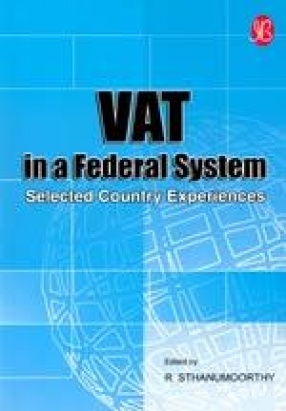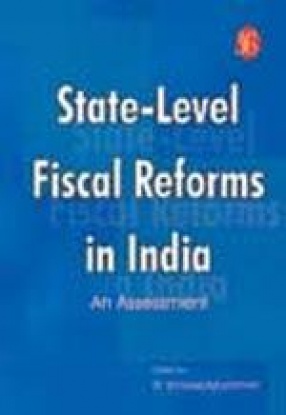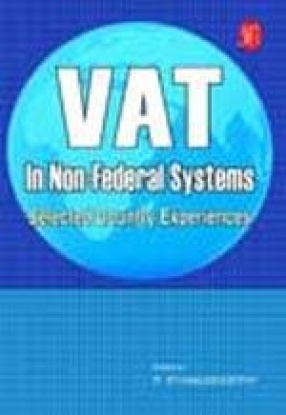
R. Sthanumoorthy

Showing all 12 books

Owing to its superiority over other forms of commodity taxes, value added tax (VAT) has been in widely in use internationally. Presently, it exists in 130 countries, including India. The long-held view is that it is ideal to entrust the national government with the task of operating a VAT system because imposing VAT by sub-national governments (SNGs) is fraught with two fundamental difficulties. Many federations prefer to impose VAT only at the federal level, ...

In India, the outcome of the reform process is largely mixed. India is neither a closed economy now nor a country of scarcity with its foreign exchange reserves plentiful. Its inflation has been contained, external debt indicators have improved, exchange rate is flexible and the country is free of financial repression. Besides, liberalization has provided innumerable opportunities for starting and innovating into new business ventures, as in the software ...

Indian states today are reeling under the impact of their economic position–a problem they face due to the ballooning of revenues and fiscal deficits. This has resulted in the debt stock and interest liabilities of almost all the states increasing at a faster rate, not to mention the expenditure system that has been large and constantly on the rise. This book assesses the reform measures states in order to resurrect their finances. The articles in this book ...

Value Added Tax (VAT) is considered more superior than other forms of commodity taxes. While USA does not have VAT, it does exist in about 130 countries, including India. Most federations debate on the issue of VAT due to controversies at the national or sub-national level. This book showcases the experiences of Brazil, India, Canada, Ghana and Australia in implementing VAT.

A sharp deterioration in the fiscal health at the state level has been a cause for serious concern over the past few years. The crisis reached the pinnacle in the second half of the 1990s when a majority of the states implemented the salary revision recommendations of the Fifth Central Pay Commission for their employees. In this context, this book seeks to examine the fiscal performance of the states in India over time. It analyses trends in fiscal imbalances at ...

1. Maharashtra's Experience with VAT, 2. VAT in Haryana, 3. VAT in Brazil: Experience and Challenges, 4. VAT in Canada: A Synoptic Review, 5. Value-Added Taxes in Developing and Transitional Countries: Lessons and Questions, 6. Tax and Expenditure Assignments in India: An Overview, 7. A Critical Analysis of Sales Tax System, 8. Evolution of State-Level Value Added Tax in India, 9. Taxonomy of Value Added Tax, 10. Economic Effects of VAT, 11. VAT and ...

Energy is the basic building block for socio-economic development. Our future economic growth depends on the long-term availability of energy in increasing quantities from sources that are accessible, easily available, socially acceptable and environment-friendly. However, the ever-increasing demand for energy is causing a depletion of scarce energy resources, such as coal, gas and fossil fuels, etc. In this context, this book elaborates on the concept of energy ...

Energy efficiency involves technologies, measures or practices that produce the same amount of energy services such as lighting, heating and cooling using less energy. It is proved to be the best option to reduce the growing gap between demand and supply of energy resources. Countries are now looking towards alternative renewable sources of energy such as the wind and the sun for tapping energy. However, the cost of generating energy from renewable sources is ...

This book records the rise and growth of the IT industry during the 1990s when it grew at a compound annual growth rate of 35 percent. It generated revenue worth Rs. 97,830 crore in 2003-04. Today, it contributes 4,90,000 employees to this high growth industry that s on the up and up. This book tells us that the chief strength of the software industry lies in the fact that it exports software and in 2002-03, exports stood at 18 percent of the total exports from ...

This book is aimed at evaluating the economic performance of the state of Karnataka in India and brings to light the current challenges and opportunities facing the state. Bangalore has been the "Silicon Valley of India" and is growing faster. Besides the IT sector, Karnataka has performed well in the agricultural sector and in biotech industry. But in recent times, the state is witnessing problems in agriculture and fisheries. This has been manifested ...

This book is aimed at evaluating the economic performance of Maharashtra, India, and brings to light the current challenges the state is facing and new opportunities available to the state. Maharashtra has been the main economic powerhouse of India. It is a leading industrial state in India with good infrastructure network. The state large urban population and growing services sector provide opportunities for investment in tourism, information technology, ...

Kerala is really at a crossroads in terms of its economic development. The crucial role of public action in the realization of high human development indicators is now widely acknowledged. Despite impressive achievements on the human development front, the state has been struggling to achieve economic progress.This is evident from the low productivity of agricultural and industrial sectors, high levels of educated unemployment, inadequate infrastructure ...
